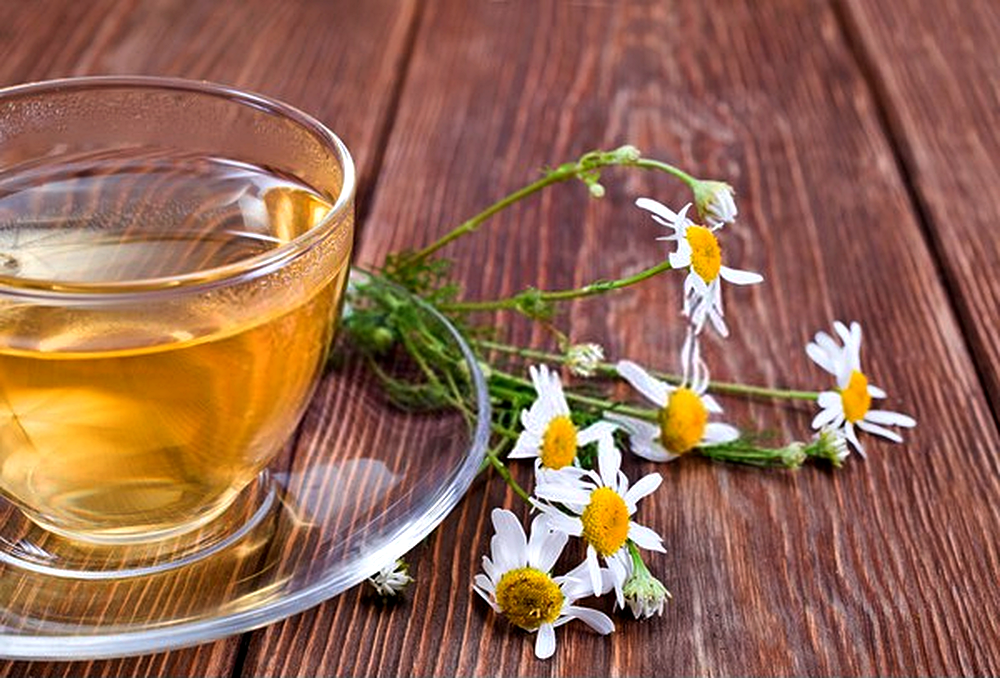Chamomile is a medicinal plant with many health benefits. Here you can find out what effect chamomile tea has and when you can use it.
Prepare camomile tea: How it works
- Put a heaped tablespoon of dried chamomile flowers in a cup and pour 250 ml boiling water over it.
- Cover the cup and let the tea steep for ten minutes. Then strain the flowers.
- Extend the brewing time if you want to use the tea in the mouth or throat area and then let it cool to a lukewarm temperature.
Chamomile Tea: Effect
Chamomile is characterised by its antispasmodic, antibacterial, relieving and soothing properties. It also calms and has an anti-fungal and anti-inflammatory effect. Camomile blossoms are used as medicines. They contain valuable essential oil and flavonoids, which have many positive properties. In addition, the camomile flowers contain mucilages which are beneficial for the mucous membranes in the digestive tract.
Chamomile Tea: Application
Camomile blossom tea can be used for example:
- Cold or cough: The inhalation of hot chamomile tea can be used for inflammation of the respiratory tract.
- Gastrointestinal infections and gastritis as well as stomach ulcers can be alleviated with chamomile tea. The tea helps to relax cramped muscles. In case of gastritis, a cup of tea should be taken before breakfast.
- Inflammation of the gums or ulcerated tonsils: Due to its anti-inflammatory properties, chamomile tea is also suitable for these complaints. But beware: only lukewarm tea is recommended for rinsing, drinking and gargling in this case, as otherwise the heat promotes blood circulation and contributes to the spread of bacteria.
- Heartburn: The acid production in the stomach is neutralized by camomile, which can reduce heartburn.
- Sleep disorders: Chamomile tea has a calming effect, reduces stress and helps people with sleep disorders to relax.
- Menstrual cramps, flatulence and a feeling of fullness can be alleviated with tea.
- Acne: Externally, as a facial toner, tea can alleviate mild acne.
- Smaller wounds: Abrasions could become infected – to prevent this, wounds can be cleaned with cooled chamomile tea.
- Diabetes: Chamomile tea can be used as an additional aid to lower blood sugar levels in diabetes. However, tea is not a substitute for medication!
Attention: When using, pay attention to organically grown chamomile (Matricaria chamomilla) or buy the chamomile tea from the pharmacy, which has been checked for its active ingredient content. Tea bags from the supermarket do not contain the necessary amount of active ingredient!
Camomile blossoms: What you have to consider
- The real chamomile belongs to the plant family of the composite flowers. Do not use chamomile if you are allergic to composite flowers.
- People who suffer from a severe pollen allergy can get allergic reactions from camomile blossoms.
- Do not use chamomile on or in the eye – it may cause conjunctivitis.
- In case of acute symptoms, up to three cups of chamomile tea per day can be taken. Excessively consumed tea can, however, cause unpleasant hypersensitivity reactions such as nausea. Camomile tea can also contain small amounts of the plant poisons pyrrolizidine alkaloids, which can be carcinogenic or mutagenic in a high dosage.
- Interactions may occur if you take antidepressants or ibuprofen. Warfarin or ciclosporin are also suspected of interacting with chamomile. It is therefore advisable to consult your doctor. Also check with your doctor if you are breast-feeding, pregnant or taking blood thinners!

